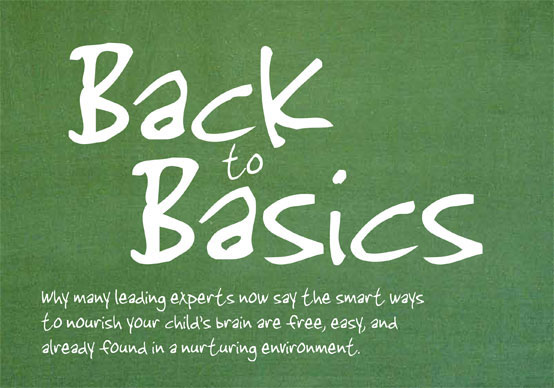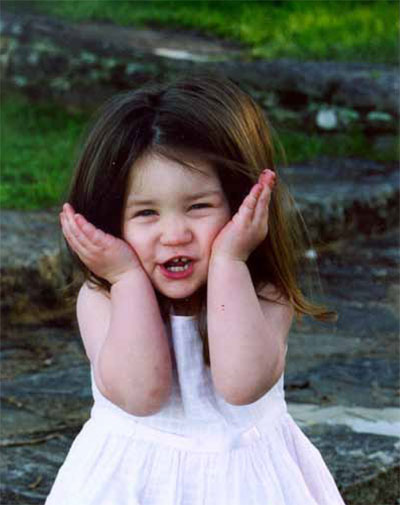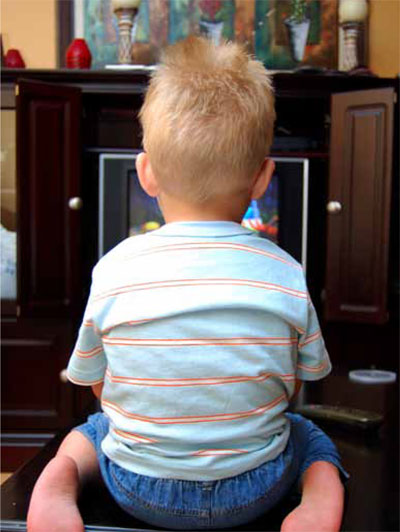Back to Basics

W
hen Nicole Imprescia sent her 4-year-old daughter to preschool, she was expecting Lucia would learn more than shapes, colors, and the "letter of the week." Even the basic French vocabulary instruction and "author of the month" were not what she was looking for. The gymnastics area with mats and equipment to rival any college gymnasium was insufficient. For the $19,000 yearly tuition, she expected her daughter would be prepped for the ERB (the admissions test required to get into elite Manhattan kindergartens) because she says admission to the Ivy League schools begins in preschool. Imprescia was particularly disappointed that her daughter was sometimes interacting with children younger than herself (the school accepts children from ages 2.3 years to 4.11 years). She decided to sue the school for deceptive trade practices, claiming that the "school proved not to be a school at all, but just one big playroom."
"At what age and to what extent one must intervene in a child's development to facilitate optimal growth is a subject of intense debate."
Her expectations are not unique. Parents everywhere are inundated with videos, techniques, and toys designed to help their kids learn. The 2005 Toy of the Year selected by the Toy Industry of America was the V.Smile, a device that claims "you'll never get into college if you don't play your video games!" Its cartridges (called "smartridges") sell for around $15, in addition to the price of the console. The company describes the system as a way to "turn game time into brain time" and says the electronic toy will create an "engaging and educational experience for preschoolers." Blocks no longer get your child into Yale, apparently.
Just as the launching of Sputnik propelled gifted education to the foreground of national consciousness, Joseph McVicker Hunt's 1961 book Intelligence and Experience changed forever the way people perceived childhood. Dr. Hunt's assertion that IQ was not fixed and "experience programs the development of the brain" changed the way people viewed childhood. His research led directly to programs such as Head Start and schools like York Preschool, and his work, along with that of other researchers and psychologists, also paved the way for what are now called "educational toys." Recently, Malcolm Gladwell's book Outliers brought renewed interest to the complex exchange between genetics and environment that leads to high achievement. Many readers took away the idea that to be any good at anything, one must start young — very young. If you're going to get 10,000 hours of practice in, you'd better begin early.
At what age and to what extent one must intervene in a child's development to facilitate optimal growth is a subject of intense debate. This is partly due to the lack of agreement about the genesis of intelligence and achievement on the part of experts. "The roots of intelligence are not well defined," says Dr. Eric Chudler, executive director, National Science Foundation Engineering Research Center for Sensorimotor Neural Engineering at the University of Washington and the driving force of a neuroscience website for kids. "If you asked 10 different scientists, philosophers, and psychologists, you would probably get consensus that it is a combination of environment and something genetic, but what combination exactly isn't well known. We do know that when they do brain scans on expert musicians, they see that musicians who learn music early on have brain changes that others don't. There is something critical, in music at least, about early learning."
There is something critical about early learning with regard to language as well. Dr. Patricia Kuhl at the Institute for Learning and Brain Sciences has become world famous for her work with children's language acquisition. Her research has demonstrated that while each of the 133 million babies born each year is hardwired to learn any language, by the age of 12 months they are tracked to their native languages. Kuhl further argues this is all a result of human interaction. Her research has shown that inanimate language exposure (audio tapes, etc.), produces no lasting effects. Unfortunately, there is no such thing as an Esperanto Effect in which parents can immerse their babies in a multimedia multilingual environment and produce a polyglot from thin air.
 These ideas would seem to privilege the kind of parenting Nicole Impresia is engaging and litigating her way through, but it's not that simple. Kuhl co-authored a book called Scientist in the Crib in which she argues against this. "Grown-ups are designed to behave in a way that will allow babies to learn. For human beings, nature is our nurture." One reason that interventionist parenting is unlikely to produce a smarter child is that babies don't actually need more things in their brains; in some ways, they need fewer. Toddlers and preschoolers have around 15,000 synapses per neuron, while adults have perhaps half that number. Our brains naturally eliminate connections they don't need, producing a more efficient mental computer, although "computer" isn't actually the best metaphor for the brain.
These ideas would seem to privilege the kind of parenting Nicole Impresia is engaging and litigating her way through, but it's not that simple. Kuhl co-authored a book called Scientist in the Crib in which she argues against this. "Grown-ups are designed to behave in a way that will allow babies to learn. For human beings, nature is our nurture." One reason that interventionist parenting is unlikely to produce a smarter child is that babies don't actually need more things in their brains; in some ways, they need fewer. Toddlers and preschoolers have around 15,000 synapses per neuron, while adults have perhaps half that number. Our brains naturally eliminate connections they don't need, producing a more efficient mental computer, although "computer" isn't actually the best metaphor for the brain.
The Association for Childhood Education International (ACEI) says, "The best metaphor to describe the brain is that it is like a 'jungle' with rich, diffuse interconnections, rather than like a 'computer' with machine-like qualities."
So how can parents navigate that jungle appropriately? The message has been well-received that there is a window of opportunity to teach children, and that window is narrow. But neuroscientists are backing away from that assumption with all deliberate speed, and many are on a crusade to take the hearts and minds of parents with them. John Bruer, in his book The Myth of the First Three Years, says "most learning is not subject to critical-period constraints, not confined to windows of opportunity that slam shut.'' Rather than "windows of opportunity," neuroscientists now refer to "sensitive periods" in which we learn more easily, but not exclusively. During those "sensitive periods," children who are well-fed, safe, and living in a warm, nurturing environment with access to adequate materials will learn all they need to in the context of normal human interaction, with little need for the kind of hyper-intense forced learning some advocate.
"One thing that science tells us is that nature has designed us to teach babies, as much as it has designed babies to learn," Kuhl says. Dr. Kathy Hirsh-Pasek, author of Einstein Didn't Use Flashcards, agrees that the most essential learning for babies and young children comes naturally within a healthy learning environment. "Babies start walking at 12 to 13 months," she says. "And kids who start walking early aren't necessarily going to be race winners. If we try to have a walking school, people would say we're being ridiculous. If I say the same for math, nobody would say I'm being ridiculous."
The true magic elixir appears to be the very thing parents such as Nicole Imprescia disdain — play. Dr. Joe Frost, author of Neuroscience, Play, and Child Development, calls play the "language of children" and advocates families, schools, and other institutions "rearrange their attitudes and priorities about play." Play turns out to be far more valuable than many realize. "Play has become a four letter word in society, yet we suffer from a creativity crisis. We need more play, not less," Hirsh-Pasek says.
"Play programs neural structures and resulting, increasingly complex, neural structures influence ever more complex play," Frost adds.
Complex play sounds, well, complex. How can parents determine the "right" way to play, if there is such a thing? The authors of Scientist in the Crib say that building a better brain isn't the result of spending more money. On the contrary, they argue that we should be "deeply suspicious of any enterprise that offers a formula for making babies smarter or teaching them more, from flash cards to Mozart tapes to Better Baby Institutes. Everything we know about babies suggests that these artificial interventions are at best useless and at worst distractions from the normal interaction between grown-ups and babies."
This isn't welcome news to what Alissa Quart in the Atlantic Monthly called the Baby Genius Edutainment Complex — an industry that generated $4.8 billion in sales in 2004 on videos and DVDs alone. When a University of Washington study indicated DVDs and television geared to young children actually had a deleterious effect on language acquisition, Disney, owner of the "Baby Einstein" brand, fought back with a statement indicating its products were not as bad as "Teletubbies," although it did offer refunds to parents who purchased the DVDs expecting them to improve children's cognitive development.
 Despite researchers' findings, the Kaiser Foundation found that of the 100 top-selling DVDs on Amazon.com listed for children under 2, 76 percent made educational claims, and 49 percent of parents considered edutainment products "very important to children's intellectual development."
Despite researchers' findings, the Kaiser Foundation found that of the 100 top-selling DVDs on Amazon.com listed for children under 2, 76 percent made educational claims, and 49 percent of parents considered edutainment products "very important to children's intellectual development."
"But," Hirsh-Pasek says, "that's just not how kids learn language. It's not the case that by watching these things you're somehow building better brains. We've all been duped."
The American Academy of Pediatrics, for instance, recommends absolutely no screen time for children under 2 — even videos with floating colored balloons and Mozart in the background. Yet on average babies spend an hour a day watching TV and another 45 minutes with other media (such as videos).
"We're all trapped in the learning illusion," Hirsh- Pasek says. "I think you've got on the one hand this intense fear that parents have when they hear about global competition in the marketplace, and they don't want to leave any stone unturned. Then we have the learning industry that makes tests and controls toys and tells us that if we use them, our children will be smarter than the rest of the world."
But desire for academic success isn't the entire story. The Kaiser study noted that Nickelodeon hit on one reason when it advertised that its videos could be put in the DVD player and the parent could "walk out of the room, and there's nothing bad the kid is going to see." If, in this busy world, a parent needs to run a load of laundry or is telecommuting to an office, popping in a video seems preferable to the child's lying on a blanket in silence.
Once again, science disagrees. Dimitri Christakis (the University of Washington scientist who found out that the videos actually depress language development) believes that they may also annoy babies. In an article published in Pediatrics, Christakis says, unlike the pace of real life, "television can portray rapidly changing images, scenery, and events. It can be over stimulating yet extremely interesting."
He is not swayed by people who say their children are mesmerized by the shows. They may not be able to stop watching, but that doesn't mean they're fun. His study showed that children who had a lot of television exposure before the age of 7 were much more likely to have attention problems later on.
So what does work, then? Talking to your baby is effective, scientists say. Playing with blocks and even the gardenvariety pots and pans teaches spatial reasoning. Young children thrive on human response. Peek-a-boo is simple, but as children grow, the verbal and non-verbal responses to their own self-discoveries are just as crucial.
"Peek-a-boo is simple, but as children grow, the verbal and non-verbal responses to their own self-discoveries are just as crucial."
As kids get older, engagement can become even more interesting. Chudler's site has lots of experiments parents can do with their kids. "We're all walking laboratories," he says, "and we can experiment with ourselves."
But what about those studies that show that musicians had to start by the time they were 7 in order to reach full potential? Every scientist interviewed for this piece agreed that while there is benefit to music study (perhaps particularly keyboard instruments), the true key is to allow the child's own interest to guide him or her. There is no Mozart effect, no panacea.
"When I'm interested in something I go full out," says Chudler, describing how he learned as a child and now. "When I was 7 or 8, I read every single book on baseball. I don't really like baseball now, but I did then. There's no turning back. It's just drive to learn a particular thing."
And so we come to what is possibly the post-industrial parent: Back to blocks and pat-a-cake and trips to the library. Rather than a pressure cooker, truly effective cognitive development seems to resemble more a petri dish with a growing medium of access to normal items found in any household, parental interaction and attention, the opportunity to follow one's own interests, and perhaps some "Ten Little Indians" on the piano. As Hirsh-Pasek says, "Brains have been developing for a long time, and the chances we're going to change evolution in one lifetime is not high."
